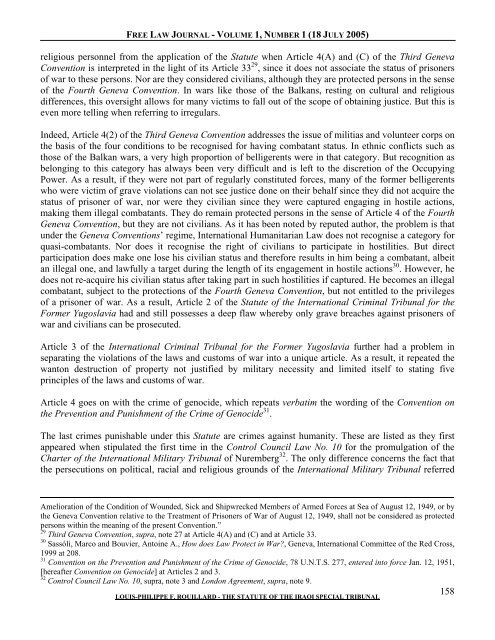Free_Law_Journal-Vol.. - Free World Publishing Inc.
Free_Law_Journal-Vol.. - Free World Publishing Inc.
Free_Law_Journal-Vol.. - Free World Publishing Inc.
You also want an ePaper? Increase the reach of your titles
YUMPU automatically turns print PDFs into web optimized ePapers that Google loves.
FREE LAW JOURNAL - VOLUME 1, NUMBER 1 (18 JULY 2005)<br />
religious personnel from the application of the Statute when Article 4(A) and (C) of the Third Geneva<br />
Convention is interpreted in the light of its Article 33 29 , since it does not associate the status of prisoners<br />
of war to these persons. Nor are they considered civilians, although they are protected persons in the sense<br />
of the Fourth Geneva Convention. In wars like those of the Balkans, resting on cultural and religious<br />
differences, this oversight allows for many victims to fall out of the scope of obtaining justice. But this is<br />
even more telling when referring to irregulars.<br />
Indeed, Article 4(2) of the Third Geneva Convention addresses the issue of militias and volunteer corps on<br />
the basis of the four conditions to be recognised for having combatant status. In ethnic conflicts such as<br />
those of the Balkan wars, a very high proportion of belligerents were in that category. But recognition as<br />
belonging to this category has always been very difficult and is left to the discretion of the Occupying<br />
Power. As a result, if they were not part of regularly constituted forces, many of the former belligerents<br />
who were victim of grave violations can not see justice done on their behalf since they did not acquire the<br />
status of prisoner of war, nor were they civilian since they were captured engaging in hostile actions,<br />
making them illegal combatants. They do remain protected persons in the sense of Article 4 of the Fourth<br />
Geneva Convention, but they are not civilians. As it has been noted by reputed author, the problem is that<br />
under the Geneva Conventions’ regime, International Humanitarian <strong>Law</strong> does not recognise a category for<br />
quasi-combatants. Nor does it recognise the right of civilians to participate in hostilities. But direct<br />
participation does make one lose his civilian status and therefore results in him being a combatant, albeit<br />
an illegal one, and lawfully a target during the length of its engagement in hostile actions 30 . However, he<br />
does not re-acquire his civilian status after taking part in such hostilities if captured. He becomes an illegal<br />
combatant, subject to the protections of the Fourth Geneva Convention, but not entitled to the privileges<br />
of a prisoner of war. As a result, Article 2 of the Statute of the International Criminal Tribunal for the<br />
Former Yugoslavia had and still possesses a deep flaw whereby only grave breaches against prisoners of<br />
war and civilians can be prosecuted.<br />
Article 3 of the International Criminal Tribunal for the Former Yugoslavia further had a problem in<br />
separating the violations of the laws and customs of war into a unique article. As a result, it repeated the<br />
wanton destruction of property not justified by military necessity and limited itself to stating five<br />
principles of the laws and customs of war.<br />
Article 4 goes on with the crime of genocide, which repeats verbatim the wording of the Convention on<br />
the Prevention and Punishment of the Crime of Genocide 31 .<br />
The last crimes punishable under this Statute are crimes against humanity. These are listed as they first<br />
appeared when stipulated the first time in the Control Council <strong>Law</strong> No. 10 for the promulgation of the<br />
Charter of the International Military Tribunal of Nuremberg 32 . The only difference concerns the fact that<br />
the persecutions on political, racial and religious grounds of the International Military Tribunal referred<br />
Amelioration of the Condition of Wounded, Sick and Shipwrecked Members of Armed Forces at Sea of August 12, 1949, or by<br />
the Geneva Convention relative to the Treatment of Prisoners of War of August 12, 1949, shall not be considered as protected<br />
persons within the meaning of the present Convention.”<br />
29 Third Geneva Convention, supra, note 27 at Article 4(A) and (C) and at Article 33.<br />
30 Sassóli, Marco and Bouvier, Antoine A., How does <strong>Law</strong> Protect in War?, Geneva, International Committee of the Red Cross,<br />
1999 at 208.<br />
31 Convention on the Prevention and Punishment of the Crime of Genocide, 78 U.N.T.S. 277, entered into force Jan. 12, 1951,<br />
[hereafter Convention on Genocide] at Articles 2 and 3.<br />
32 Control Council <strong>Law</strong> No. 10, supra, note 3 and London Agreement, supra, note 9.<br />
158<br />
LOUIS-PHILIPPE F. ROUILLARD - THE STATUTE OF THE IRAQI SPECIAL TRIBUNAL
















